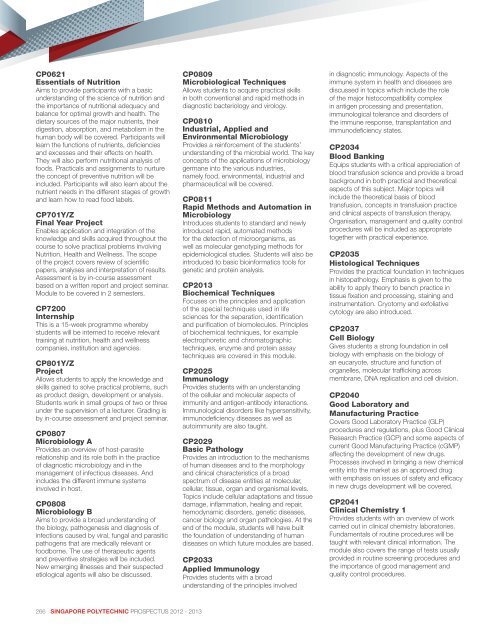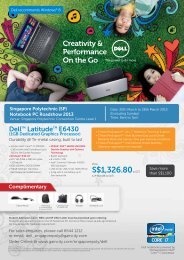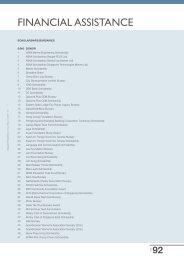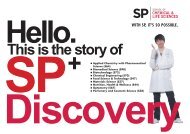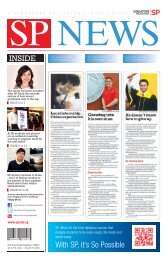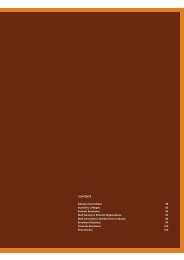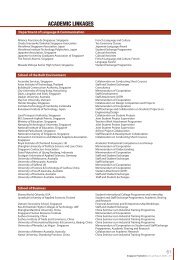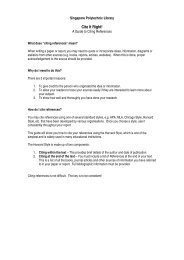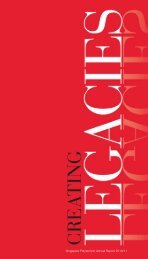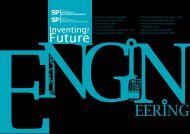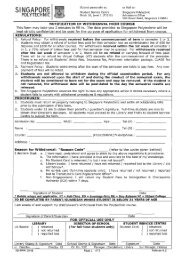Untitled - Singapore Polytechnic
Untitled - Singapore Polytechnic
Untitled - Singapore Polytechnic
- No tags were found...
Create successful ePaper yourself
Turn your PDF publications into a flip-book with our unique Google optimized e-Paper software.
CP0621Essentials of NutritionAims to provide participants with a basicunderstanding of the science of nutrition andthe importance of nutritional adequacy andbalance for optimal growth and health. Thedietary sources of the major nutrients, theirdigestion, absorption, and metabolism in thehuman body will be covered. Participants willlearn the functions of nutrients, deficienciesand excesses and their effects on health.They will also perform nutritional analysis offoods. Practicals and assignments to nurturethe concept of preventive nutrition will beincluded. Participants will also learn about thenutrient needs in the different stages of growthand learn how to read food labels.CP701Y/ZFinal Year ProjectEnables application and integration of theknowledge and skills acquired throughout thecourse to solve practical problems involvingNutrition, Health and Wellness. The scopeof the project covers review of scientificpapers, analyses and interpretation of results.Assessment is by in-course assessmentbased on a written report and project seminar.Module to be covered in 2 semesters.CP7200InternshipThis is a 15-week programme wherebystudents will be interned to receive relevanttraining at nutrition, health and wellnesscompanies, institution and agencies.CP801Y/ZProjectAllows students to apply the knowledge andskills gained to solve practical problems, suchas product design, development or analysis.Students work in small groups of two or threeunder the supervision of a lecturer. Grading isby in-course assessment and project seminar.CP0807Microbiology AProvides an overview of host-parasiterelationship and its role both in the practiceof diagnostic microbiology and in themanagement of infectious diseases. Andincludes the different immune systemsinvolved in host.CP0808Microbiology BAims to provide a broad understanding ofthe biology, pathogenesis and diagnosis ofinfections caused by viral, fungal and parasiticpathogens that are medically relevant orfoodborne. The use of therapeutic agentsand preventive strategies will be included.New emerging illnesses and their suspectedetiological agents will also be discussed.CP0809Microbiological TechniquesAllows students to acquire practical skillsin both conventional and rapid methods indiagnostic bacteriology and virology.CP0810Industrial, Applied andEnvironmental MicrobiologyProvides a reinforcement of the students’understanding of the microbial world. The keyconcepts of the applications of microbiologygermane into the various industries,namely food, environmental, industrial andpharmaceutical will be covered.CP0811Rapid Methods and Automation inMicrobiologyIntroduces students to standard and newlyintroduced rapid, automated methodsfor the detection of microorganisms, aswell as molecular genotyping methods forepidemiological studies. Students will also beintroduced to basic bioinformatics tools forgenetic and protein analysis.CP2013Biochemical TechniquesFocuses on the principles and applicationof the special techniques used in lifesciences for the separation, identificationand purification of biomolecules. Principlesof biochemical techniques, for exampleelectrophoretic and chromatographictechniques, enzyme and protein assaytechniques are covered in this module.CP2025ImmunologyProvides students with an understandingof the cellular and molecular aspects ofimmunity and antigen-antibody interactions.Immunological disorders like hypersensitivity,immunodeficiency diseases as well asautoimmunity are also taught.CP2029Basic PathologyProvides an introduction to the mechanismsof human diseases and to the morphologyand clinical characteristics of a broadspectrum of disease entities at molecular,cellular, tissue, organ and organismal levels.Topics include cellular adaptations and tissuedamage, inflammation, healing and repair,hemodynamic disorders, genetic diseases,cancer biology and organ pathologies. At theend of the module, students will have builtthe foundation of understanding of humandiseases on which future modules are based.CP2033Applied ImmunologyProvides students with a broadunderstanding of the principles involvedin diagnostic immunology. Aspects of theimmune system in health and diseases arediscussed in topics which include the roleof the major histocompatibility complexin antigen processing and presentation,immunological tolerance and disorders ofthe immune response, transplantation andimmunodeficiency states.CP2034Blood BankingEquips students with a critical appreciation ofblood transfusion science and provide a broadbackground in both practical and theoreticalaspects of this subject. Major topics willinclude the theoretical basis of bloodtransfusion, concepts in transfusion practiceand clinical aspects of transfusion therapy.Organisation, management and quality controlprocedures will be included as appropriatetogether with practical experience.CP2035Histological TechniquesProvides the practical foundation in techniquesin histopathology. Emphasis is given to theability to apply theory to bench practice intissue fixation and processing, staining andinstrumentation. Cryotomy and exfoliativecytology are also introduced.CP2037Cell BiologyGives students a strong foundation in cellbiology with emphasis on the biology ofan eucaryote, structure and function oforganelles, molecular trafficking acrossmembrane, DNA replication and cell division.CP2040Good Laboratory andManufacturing PracticeCovers Good Laboratory Practice (GLP)procedures and regulations, plus Good ClinicalResearch Practice (GCP) and some aspects ofcurrent Good Manufacturing Practice (cGMP)affecting the development of new drugs.Processes involved in bringing a new chemicalentity into the market as an approved drugwith emphasis on issues of safety and efficacyin new drugs development will be covered.CP2041Clinical Chemistry 1Provides students with an overview of workcarried out in clinical chemistry laboratories.Fundamentals of routine procedures will betaught with relevant clinical information. Themodule also covers the range of tests usuallyprovided in routine screening procedures andthe importance of good management andquality control procedures.266 SINGAPORE POLYTECHNIC PROSPECTUS 2012 - 2013


